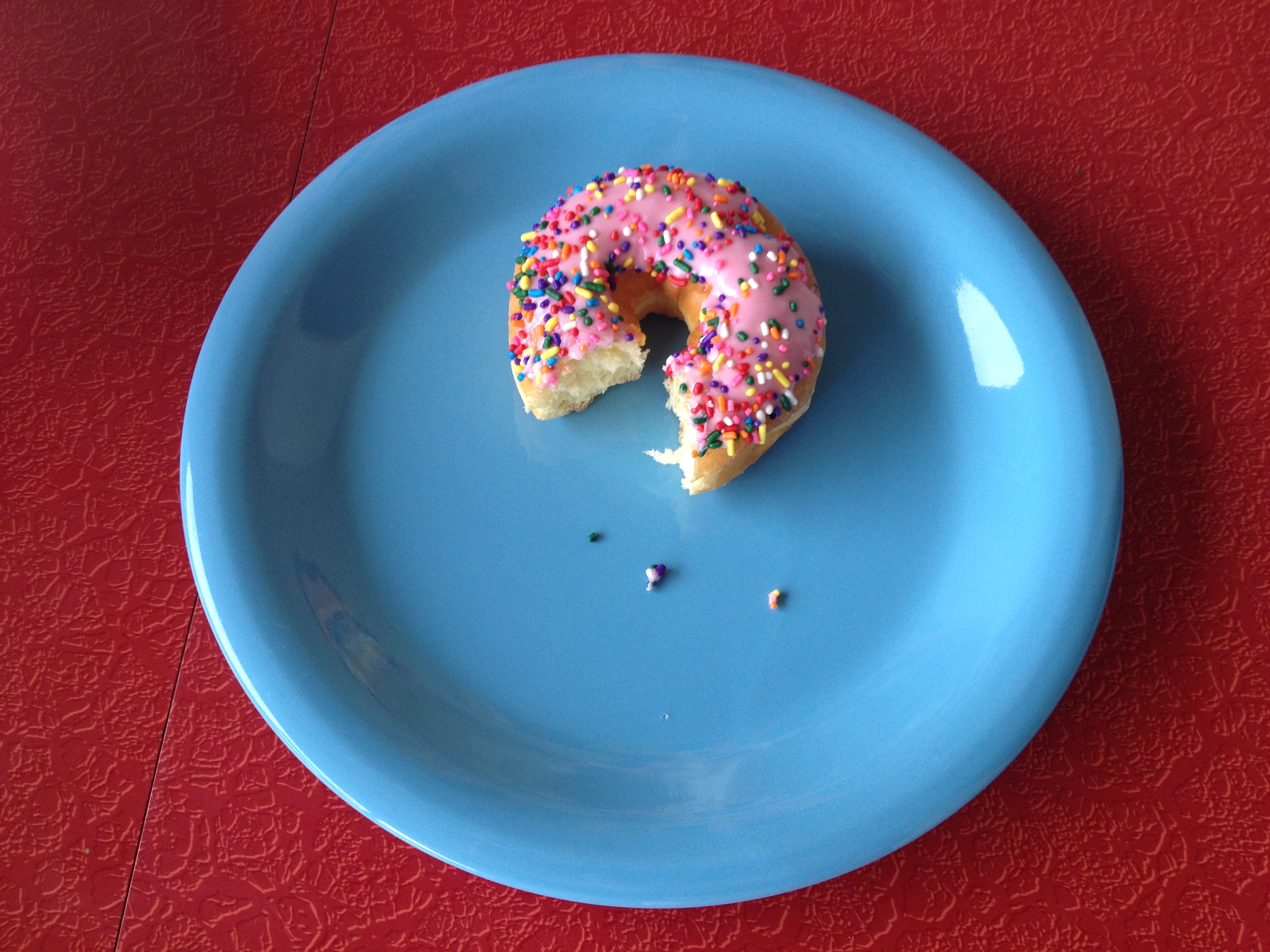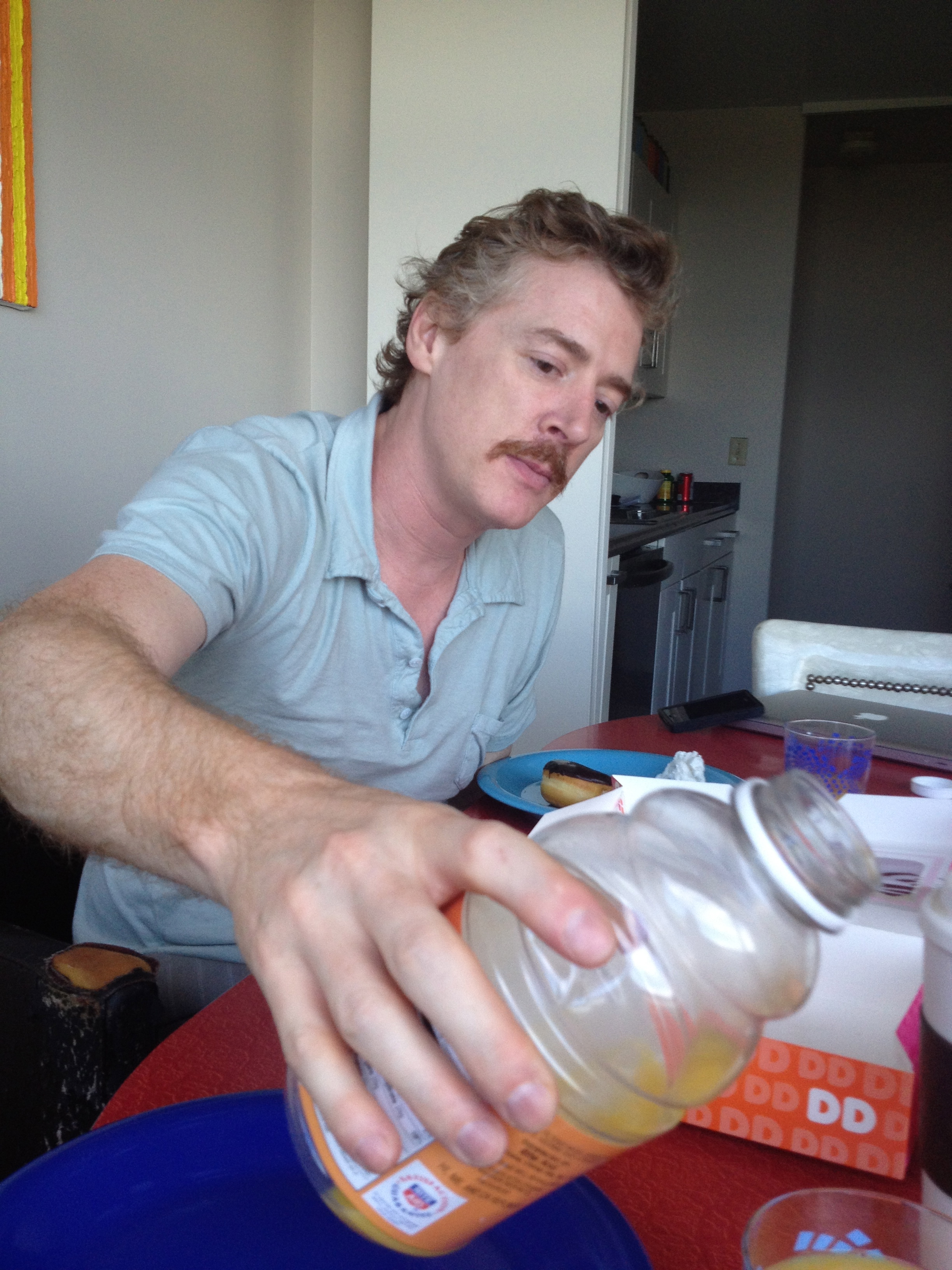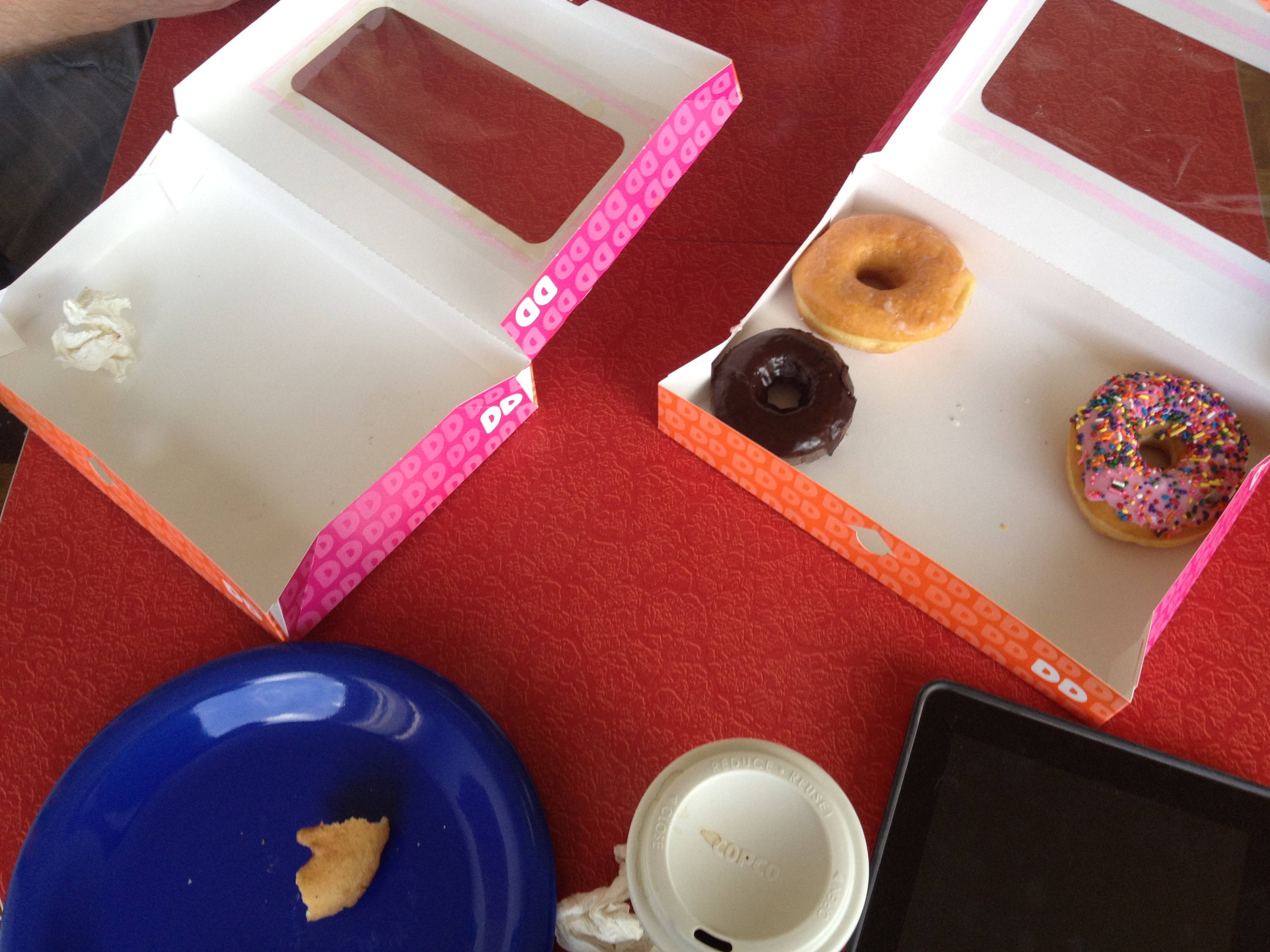Author Spotlight
Eating Donuts with Michael Kimball

I showed up at Michael Kimball’s sweet new condo with a dozen donuts.
His father was a fat man, like the title character in Big Ray, Kimball’s latest novel that you’ve heard so much about. We poured out glasses of orange juice, and in memory of his father, dug into those gross ass donuts.
For the first twenty minutes of what would be a two hour conversation, Michael recounted the events of the previous Saturday night, a rowdy, drunken time we had that I beered out of memory. Listening to the stories was like hearing about myself as if I was my own close friend who missed a party I threw.
Reading Big Ray is like hearing about an equally close friend processing some serious loss. Michael Kimball does emotional immediacy better than any writer alive, I shit you not.
Big Ray, is about a man named Daniel trying to understand his father’s death, and through that, his own life. Ray, the father, was a cold hearted dickhead. He abused his family in physical and emotional and sexual ways. His meanness was arbitrary and confounding. And more fundamental to the life of his story, he was massively overweight.
As he does in all of his books, Michael writes with a straightforward, heartbreaking clarity. This book eclipses Dear Everybody and Us with sentences weighted with raw meat. He tenderizes the reader with funny, obvious declarations that also manage to drip with sadness.
Like, the dedication reads, “To my dead dad.” I took a Homer Simpson donut and asked him how he could be so flip.
“It’s part flippant, part other things too,” he said. It suggests that it’s written by a person that “feels maybe some mixed emotions about the dad being dead. He dedicates it to him, which is an act of generosity. But the adjective ‘dead’ there in front of dad suggests that maybe there’s a hate there, too. I almost hear a punk song when I hear it, so maybe there’s a gleeful brashness to it. It’s like, just scream ‘my dad is dead, my dad is dead’ over and over.”
Big Ray is told in short sections, which makes it easy to read even while you’re aware that something new and profound is happening. And much of what happens is true to Michael’s own life. He began the book as a memoir. His own father died because he ate too much.
Daniel writes, “I don’t know if it counts as a kind of suicide—to eat yourself to death.”
At the end of the first chapter, Daniel talks about the obituary, which notes who his dead father was “survived by.” The last sentence goes, “I’m one of the people who survived.” I asked Michael about that.
“I was already into the book and I realized I needed to write something about the obituary, and I found the obituary—I had a newspaper copy of it somewhere—and so I pulled it out and was writing about it and there was something in there—the language in the piece gave it to me. But it was also … I don’t quite know how to say this … for people who have been abused—abuse, it’s a thing you survive. That was one of the times that I didn’t feel bad about foreshadowing.”
Michael took a sour cream donut and I had a blueberry cake that ruined me. Michael explained how foreshadowing is usually lame. “It needs to be done strongly. Or understated,” he said.
 That brought up how he is able to state the obvious while maintaining emotional impact and humor. Just like his book, it’s remarkable how much of our conversation moved between talk of miserable abuse and making jokes.
That brought up how he is able to state the obvious while maintaining emotional impact and humor. Just like his book, it’s remarkable how much of our conversation moved between talk of miserable abuse and making jokes.
I said, “Going along with how it can be funny—this whole book is funny, but it’s extremely cruel.“ There are several sections where Daniel imagines various death scenarios for his father. There are 15 “Yo daddy’s so fat” jokes, like “Yo daddy’s so fat he wakes up in sections” and “every time he turns around it’s his birthday.”
I noted a moment where, as a boy, Daniel would turn the lights off if his father was in the room. “I never told anybody why, but I was trying to make him disappear,” Daniel says.
Michael said, “The thought is only cruel because of other implied cruelties. A person doesn’t have that thought—that they want someone else to disappear—unless there’s a good reason for that person to disappear. Who wouldn’t want that father to disappear?”
Ray’s wife, too, would be mean to him, saying things like, “I always wanted to marry a tall man.” I asked if this made Ray almost a sympathetic character. He takes a lot of shit.
“He does, but he gives a lot more. I don’t know if he becomes sympathetic, but there are points when the reader might have a kind of pity for him. Or, without saying sympathetic, feel sorry for him. Because he also has issues that he hasn’t dealt with. There’s an implied story that brings him to that point.”
“It does fill him out, in a way,” I said.
We laughed at that. “Donuts filled him out,” Michael said. I picked at a donut with Baltimore Ravens colors, purple and black.
More serious, Michael went on: “If it’s just the cruelness and the meanness and the abuse, if it’s just that, whatever emotional power there is, well, there’s going to be less. One of the things the narrator struggles with throughout are the mixed emotions, the love and the hate. Like, my father did these terrible things to me but there was also the time that he shook the leaves from the trees—and that was amazing.”
Michael wore an expression of genuine fondness as he said that.
“So there were other parts to it that make him more human, more relatable, more understandable, and he becomes a real thing, rather than just that caricature. We’re used to that caricature.”
“He becomes a good villain,” I said. “A complex one. Would you consider him a villain?”
“What else?”
I asked Michael if he could have written the book in 2004, before his father died. He said no. I asked if he could have written it right after.
“Nope,” he said. “My father died in 2005. We hadn’t talked for a while. I had tried to reestablish an adult relationship with him for a few years, and that went pretty badly. We went from this period where we talked regularly and I visited him in Vegas pretty regularly to this period where I stopped answering the phone when he called. I just couldn’t bear it anymore. And that went on for a little over a year, I think. But he still called everyday, left messages, and finally one day I picked up the phone and that year of not talking seemed to be instantly forgotten. I said I was really busy.”
“Which is all told in the book, right?”
“Yeah, there’s a version of that in the book. So I just started talking to him again, I had the reserves to do it or something, and so a lot of my feelings were still mixed up, I was still processing them. And then to have him, just a month later, die—he’d been in really bad health for years before that and had started to get better—it didn’t seem like that was going to happen. And so when it did happen, and it happened unexpectedly, I felt relieved that he didn’t call for a few days. But he didn’t call for a few days because he was dead. I felt really terrible about all that, and so in the weeks after he died I just started writing down all the things I was thinking and feeling, and then I put that notebook away. I looked at it again a few years after that and tried to type some of it out. This was 2008 or so, and I couldn’t stop crying long enough to actually think about what I was doing there. So I just put it away again.
“Then I was writing what I thought was going to be another novel, a different novel, and I had written a bunch of chapters for it and I was feeling pretty good about this thing. There was going to be a chapter about fathers. I had these different fathers and father figures in there and I used some bits from that notebook, and then it started just coming out, and all the other fathers just disappeared really quickly. And the book just came in a rush.
“The whole thing was written in three months. I’d never done anything like that before. After that three months, I realized I couldn’t possibly have done this at another point. I had to get ready for it. I’m not sure what made me ready, but somewhere in my head I was able to process this stuff. And afterward I really felt different. There was a huge release in writing this. I felt lighter. That was the most obvious thing. I just felt this sense of lightness. There had been someone pushing me down for all my life, and I never quite realized it and now all that was gone. I felt a different sense of myself. I felt as though I was standing up straighter.”

I ate four donuts that day. Michael ate five. I felt how I felt that afternoon I read Big Ray—full.
Tags: big ray, michael kimball

This is so so so fucking lovely. Big Ray is one of the top two or three books of the year. His reading at Franklin Park was perfect. Like glass. Thanks, Adam.
Where did you get the donuts from?
They look Dunkin
And the new novel is amazing. Way better than any food or doughnut
[…] In other writers named Michael news: Michael Kimball and donuts. […]
Michael Kimball. A column of light.
[…] “Eating Donuts with Michael Kimball” (from HTML Giant) After reading about walking, health labels, and vegan food; don’t you just want a donut? Well have one as you read this camaraderous conversation with the author of Big Ray – a captivating, fragmentary novel from a son after his obese father’s death. […]
[…] “Eating Donuts with Michael Kimball” (from HTML Giant) After reading about walking, health labels, and vegan food; don’t you just want a donut? Well have one as you read this camaraderous conversation with the author of Big Ray – a captivating, fragmentary novel from a son after his obese father’s death. […]